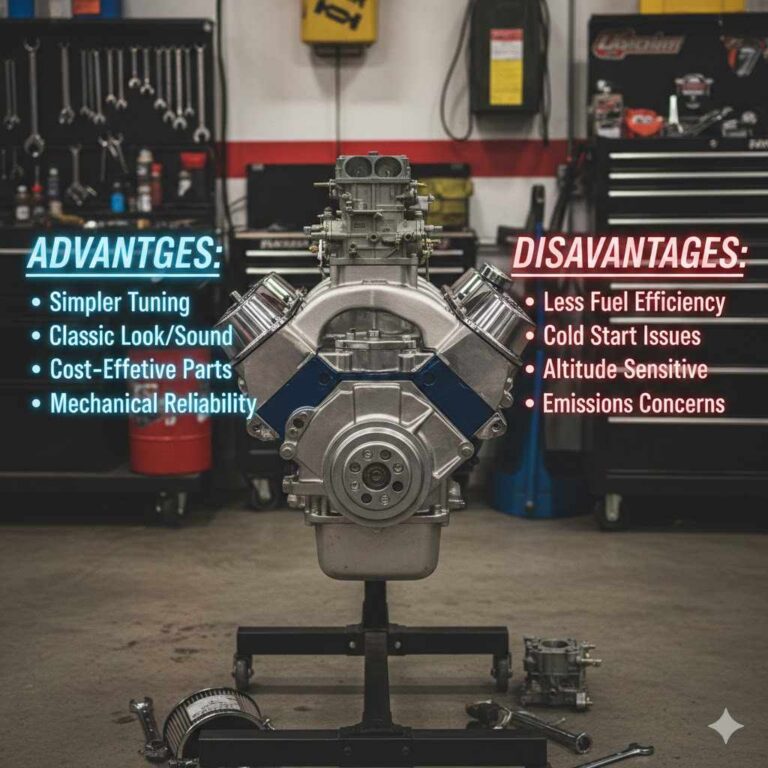What is the Meaning of Automobile Technology: Innovations Unveiled
Automobile technology refers to the construction, inspection, maintenance, and repair of cars and trucks, utilizing various power sources such as diesel, electric, gasoline, and alternative substances like ethanol. It encompasses the study of self-propelled vehicles and their movement, as well as the creation, design, and remediation of vehicle technology.
Automotive technology also incorporates advancements in artificial intelligence (AI) technologies such as machine learning, deep learning, and computer vision, which are used to guide self-driving cars, manage fleets, and enhance driver safety. Pursuing a career in automotive technology involves studying the mechanics and technology driving today’s cars, as well as acquiring skills in engineering, mechanics, and computer technology.
Defining Automobile Technology
Automobile technology encompasses the construction, inspection, maintenance, and repair of cars and trucks. It utilizes diesel, electric, gasoline, and alternative substances like ethanol. The automotive industry has seen a surge in artificial intelligence technologies, including machine learning, deep learning, and computer vision, for self-driving cars and improved safety. Automotive technology also involves the study of self-propelled vehicles and the design of vehicle technology, encompassing engines, engineering, mechanics, and computer technology.
Historical Milestones In Automotive Tech
Automotive technology encompasses the construction, inspection, and maintenance of vehicles. It utilizes various fuel types, including diesel, electric, and gasoline, along with alternative substances like ethanol. The industry has witnessed the integration of artificial intelligence (AI) technologies for self-driving cars, fleet management, and enhanced driver safety. Automotive technology studies the design, engineering, and computer systems of vehicles, addressing remediation and repairs. Additionally, it involves maintaining and diagnosing mechanical issues in light vehicles from different manufacturers, offering cost-effective solutions within commercial timelines.
Current Trends In Vehicle Technology
Automobile technology has seen various advancements in recent years, with electric and hybrid vehicles gaining popularity due to their eco-friendly nature. These vehicles use alternative substances such as ethanol and energy to reduce carbon emissions. Another trend that has emerged in the automobile industry is the integration of AI and machine learning. These technologies are used to guide self-driving cars, manage fleets, and assist drivers for improved safety.
| Functions of Automotive Technology |
|---|
| – Construction, inspection, maintenance, and repair of cars and trucks |
| – Use of diesel, electric, gasoline, and alternative substances such as ethanol, fuel, or energy |
| – Study of how self-propelled vehicles move |
| – Creation or design of vehicle technology |
| – Remediation or repairs required |
Automobile technology is defined as the study of how self-propelled vehicles move. It involves the creation or design of vehicle technology and the remediation or repairs required. The industry has also seen a surge in artificial intelligence (AI) technologies, such as machine learning, deep learning, and computer vision. These technologies are used to guide self-driving cars, manage fleets, and assist drivers for improved safety.
The Impact Of Automobile Tech On Society
The impact of automobile technology on society has been significant, especially in terms of transforming transportation dynamics. The development of automotive technology has brought about major changes in how people travel and commute. However, it’s important to consider the environmental implications of this technology as well. With the use of various fuels such as diesel, electric, gasoline, and alternative substances like ethanol, environmental considerations have become increasingly important.
Futuristic Automotive Innovations
Automobile technology encompasses the latest advancements in vehicle design, engineering, and technology. From self-driving cars to electric vehicles, automotive innovation is shaping the future of transportation. These futuristic developments aim to improve safety, efficiency, and sustainability on the roads.
| Futuristic Automotive Innovations |
| Self-driving Cars |
| Self-driving cars are a game-changing technology that has the potential to revolutionize the automotive industry. With the ability to sense their surroundings and make decisions based on data, self-driving cars have the potential to reduce accidents and traffic congestion, as well as provide greater mobility to those who are unable to drive. |
| Advanced Safety Features |
| Advanced safety features, such as lane departure warning, adaptive cruise control, and automatic emergency braking, are becoming increasingly common in modern cars. These features use sensors and cameras to monitor the vehicle’s surroundings and provide warnings or take action to prevent accidents. They are an important step towards achieving greater safety on the roads. |
Educational Pathways In Automotive Technology
Automotive technology is a field of study that focuses on the construction, inspection, maintenance, and repair of cars and trucks. It involves the use of diesel, electric, gasoline, and alternative substances, such as ethanol or fuel. Degree programs and certifications are available for those interested in pursuing a career in automotive technology. These educational pathways provide students with the knowledge and skills necessary to work in the industry. Career opportunities in automotive technology are vast, with various specializations available, such as mechanics, engineers, and computer technicians.
| Degree Programs and Certifications | Career Opportunities and Specializations |
|---|---|
| – Associate’s degree in Automotive Technology | – Automotive Engineer |
| – Bachelor’s degree in Mechanical Engineering | – Automotive Technician |
| – Automotive Service Excellence (ASE) Certification | – Automotive Electrician |
| – National Automotive Technicians Education Foundation (NATEF) Certification | – Automotive Computer Technician |
Challenges In The Automotive Industry
Automotive technology encompasses the construction, inspection, maintenance, and repair of cars and trucks. It involves the use of diesel, electric, gasoline, and alternative substances like ethanol. The automotive industry has embraced artificial intelligence technologies, including machine learning, deep learning, and computer vision to guide self-driving cars, manage fleets, and improve driver safety. Automotive technology also involves the study of self-propelled vehicles and the design and remediation of vehicle technology, covering various systems, engineering, mechanics, and computer technology. Additionally, professionals in this field are responsible for maintaining light vehicles, diagnosing complex mechanical problems, and delivering cost-effective solutions within commercial timeframes.
The Consumer Perspective
Automobile technology has evolved rapidly over the years, and consumers have been quick to adopt new technologies. From electric and hybrid vehicles to self-driving cars, consumers are always on the lookout for the latest innovations. However, with these advancements comes the need for proper maintenance and upkeep of modern vehicles. Regular servicing, software updates, and monitoring of battery life are just a few examples of the maintenance required to ensure the longevity of a vehicle. It is essential for consumers to stay up to date with the latest technology and maintenance requirements to fully benefit from the advances made in the automotive industry.
Frequently Asked Questions
What Are The Functions Of Automotive Technology?
Automotive technology involves constructing, inspecting, maintaining, and repairing cars and trucks using various fuels.
What Is The Technical Definition Of Automobile?
An automobile is a four-wheeled vehicle designed for passenger transportation. It is powered by an internal-combustion engine that runs on fuel. Automotive technology focuses on the construction, inspection, maintenance, and repair of cars and trucks. It utilizes various types of engines, including diesel, electric, and gasoline.
Which Technology Is Used In Automobile?
Automobile technology utilizes various technologies such as artificial intelligence (AI), machine learning, deep learning, and computer vision. These technologies are employed to enhance self-driving capabilities, fleet management, and driver assistance systems for improved safety.
What Is The Simple Definition Of Automobile?
An automobile is a vehicle designed for passenger transportation, typically with four wheels and powered by a gasoline or diesel engine. It is used on ordinary roads and is commonly known as a car or motorcar.
Conclusion
Automobile technology encompasses the construction, inspection, maintenance, and repair of cars and trucks. It incorporates various propulsion systems such as diesel, electric, gasoline, and alternative substances like ethanol. Additionally, the automotive industry has seen a rise in the use of artificial intelligence technologies for self-driving cars and improved safety.
Studying automotive technology involves understanding the mechanics and technology behind today’s vehicles, offering exciting career opportunities in this ever-evolving field.







